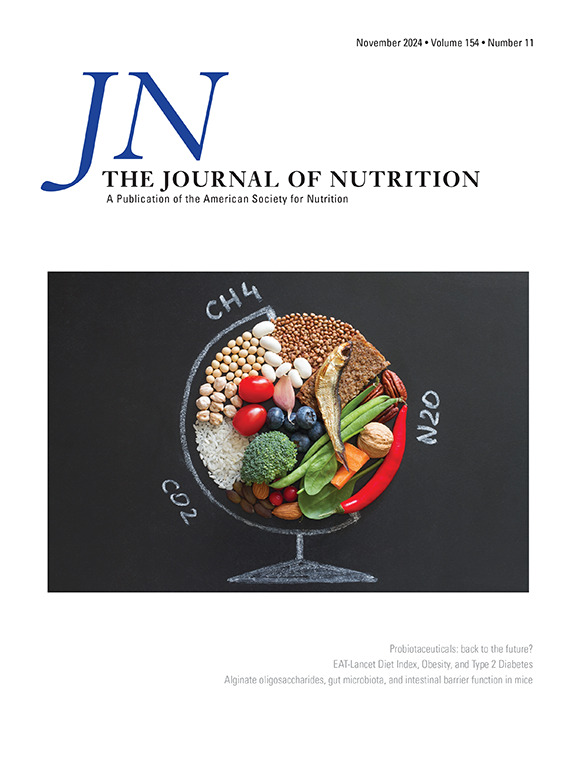Prospective Association of the Mediterranean Diet with the Onset of Cardiometabolic Multimorbidity in a UK-Based Cohort: The EPIC-Norfolk Study
IF 3.7
3区 医学
Q2 NUTRITION & DIETETICS
引用次数: 0
Abstract
Background
Cardiometabolic multimorbidity (CMM), defined as the co-occurrence of 2 or more cardiometabolic diseases, including myocardial infarction (MI), stroke, and type 2 diabetes (T2D), is an increasing public health challenge. Although poor diet is a known risk factor for a first cardiometabolic disease (FCMD), the relationship with subsequent occurrence of CMM is less studied.
Objectives
This study aims to investigate the prospective association between baseline adherence to the Mediterranean diet and the onset of CMM across various follow-up durations.
Methods
We used data from the European Prospective Investigation into Cancer-Norfolk cohort study of 21,900 adults, aged 40–79 free of prevalent MI, stroke, and T2D at baseline (1993–1997). A median-based Mediterranean diet score and a pyramid-based MDS (pyr-MDS) were used to measure baseline adherence to the Mediterranean diet. Multistate modeling was employed to investigate associations with the FCMD and the subsequent CMM event.
Results
Over the entire follow-up period of 21.4 y (median), we observed 5028 FCMD and 734 CMM events. Multistate analysis indicated that the association between baseline Mediterranean diet and the risk of CMM may be stronger in shorter follow-up durations. Particularly, baseline pyr-MDS was significantly associated with the risk of subsequent CMM transitioning from FCMD when follow-up durations were limited to 10 and 15 y, with hazard ratio (95% confidence interval) being 0.67 (0.53, 0.84) and 0.80 (0.70, 0.92) per SD increase in pyr-MDS, respectively. Additionally, we observed that the risk of CMM transitioning from FCMD was modified by social class across shorter to longer follow-ups, where the impact of baseline Mediterranean diet was only significant in nonmanual workers.
Conclusions
Baseline adherence to the Mediterranean diet was potentially associated with a lower risk of CMM transitioning from FCMD, particularly during shorter follow-up periods.
英国队列中地中海饮食与心脏代谢多病发病的前瞻性关联:EPIC-Norfolk 研究。
背景:心脏代谢多发病(CMM)是指同时发生两种或两种以上心脏代谢疾病,包括心肌梗死(MI)、中风和 2 型糖尿病(T2D)。虽然不良饮食习惯是导致首次心血管代谢疾病(FCMD)的已知风险因素,但与随后发生的心血管代谢疾病之间的关系研究较少:本研究旨在调查地中海饮食基线坚持率与不同随访时间段内 CMM 发病之间的前瞻性关联:我们使用了 EPIC-Norfolk 队列研究的数据,研究对象为 21,900 名成年人,年龄在 40-79 岁之间,基线时(1993-1997 年)无流行性心肌梗死、中风和 T2D。采用基于中位数的地中海饮食评分(m-MDS)和基于金字塔的地中海饮食评分(PYR-MDS)来衡量地中海饮食的基线坚持率。采用多态模型研究了与FCMD和随后的CMM事件之间的关联:在 21.4 年(中位数)的整个随访期间,我们观察到 5028 例 FCMD 和 734 例 CMM 事件。多州分析表明,在较短的随访期内,基线地中海饮食与 CMM 风险之间的关联可能更强。特别是,当随访时间限制在 10 年和 15 年时,基线 pyr-MDS 与随后从 FCMD 转为 CMM 的风险显著相关,每 SD pyr-MDS 增加,HR(95% CI)分别为 0.67(0.53,0.84)和 0.80(0.70,0.92)。此外,我们还观察到,从较短的随访期到较长的随访期,CMM从FCMD转变的风险受社会阶层的影响,其中基线地中海饮食仅对非体力劳动者有显著影响:结论:地中海饮食基线的坚持可能与较低的 CMM 从 FCMD 转变为 CMM 的风险有关,尤其是在较短的随访期间。
本文章由计算机程序翻译,如有差异,请以英文原文为准。
求助全文
约1分钟内获得全文
求助全文
来源期刊

Journal of Nutrition
医学-营养学
CiteScore
7.60
自引率
4.80%
发文量
260
审稿时长
39 days
期刊介绍:
The Journal of Nutrition (JN/J Nutr) publishes peer-reviewed original research papers covering all aspects of experimental nutrition in humans and other animal species; special articles such as reviews and biographies of prominent nutrition scientists; and issues, opinions, and commentaries on controversial issues in nutrition. Supplements are frequently published to provide extended discussion of topics of special interest.
 求助内容:
求助内容: 应助结果提醒方式:
应助结果提醒方式:


